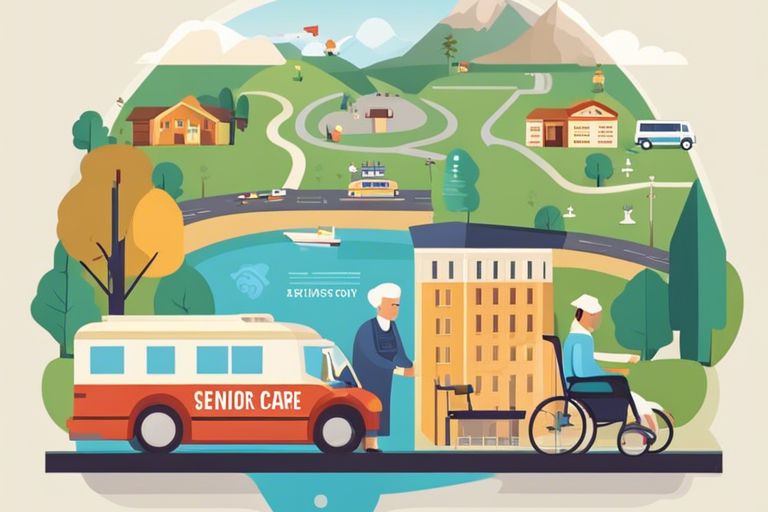Resources for senior care in California can be overwhelming to navigate. From healthcare options to community services, knowing where to turn for help is crucial. This comprehensive guide will outline the various senior care resources available in California, providing insight into the most beneficial programs and services that can support the well-being and quality of life for older adults in the state.
Key Takeaways:
- Wide range of senior care resources: California offers a comprehensive range of senior care resources including in-home care, assisted living facilities, nursing homes, and adult day care centers.
- Financial assistance programs: Seniors in California have access to various financial assistance programs such as Medicaid, Medicare, and Social Security to help cover the costs of senior care.
- State-specific resources: California has specific resources for seniors such as the California Department of Aging and local Area Agencies on Aging that provide information and support for seniors seeking care options.
Understanding Senior Care Resources in California
Types of Senior Care Resources
To effectively navigate the complex landscape of senior care resources in California, it is crucial to understand the various options available. From in-home care services to assisted living facilities, there are several types of resources tailored to meet the diverse needs of seniors. Knowing the differences between these resources can help individuals make informed decisions about the best care option for themselves or their loved ones.
| In-Home Care Services | Assisted Living Facilities |
| Provide care in the comfort of home | Offer housing, meals, and support services |
| Can include personal care, companionship, and medical assistance | Provide varying levels of care based on individual needs |
| Allow seniors to maintain independence | Encourage socialization and community engagement |
| Flexible care schedules | 24/7 supervision and emergency response |
| Cost-effective compared to facility-based care | Structured environment with amenities |
Importance of Senior Care Resources
Resources for senior care in California play a vital role in ensuring the well-being and quality of life for older adults. These resources not only provide crucial support and assistance but also offer a sense of security and peace of mind for seniors and their families. Knowing where to access the right resources can significantly impact the overall health and happiness of seniors.
Care resources can help address critical health issues, prevent social isolation, and promote active aging. By connecting seniors with the necessary support services, care resources empower them to live independently and maintain a high level of autonomy. Additionally, these resources can offer specialized care for individuals with specific medical conditions or cognitive impairments, ensuring their unique needs are met with compassion and expertise.

Senior Care Options in California
Some seniors in California may be exploring different senior care options to find the best fit for their needs. The state offers a variety of resources to cater to the diverse needs of the aging population. From in-home care to assisted living facilities, nursing homes, adult day care centers, and hospice care, seniors and their families have a range of choices to consider.
In-Home Care
The option of in-home care allows seniors to receive assistance with daily activities while remaining in the comfort of their own homes. This type of care can include help with personal care, household tasks, medication management, and even companionship services.
Assisted Living Facilities
Now, assisted living facilities in California provide a community living setting for seniors who need some assistance with activities of daily living but wish to maintain some level of independence. These facilities offer various services, including meals, housekeeping, transportation, and recreational activities, in a safe and supportive environment.
If you’re considering assisted living facilities for yourself or a loved one, it’s important to visit and tour the facilities to get a sense of the atmosphere, amenities, and level of care provided. Many assisted living facilities also offer specialized care for seniors with dementia or other medical conditions.
Nursing Homes
Care in nursing homes is designed to provide round-the-clock skilled nursing care for seniors with complex medical needs or disabilities. These facilities have medical professionals on staff to assist with medical care, rehabilitation services, and daily activities for residents who require a higher level of care.
If you’re considering nursing homes for yourself or a loved one, it’s vital to research the facility’s reputation, quality of care, staffing ratios, and available services to ensure a safe and comfortable living environment.
Adult Day Care Centers
Plus, adult day care centers offer a structured program for seniors who require supervision and socialization during the day while their primary caregivers are at work or need respite. These centers provide meals, activities, and personal care assistance in a group setting, allowing seniors to interact with their peers and participate in stimulating activities.
Care at adult day care centers can help seniors maintain their independence and enhance their quality of life by providing a supportive environment and engaging activities tailored to their needs. It also offers caregivers peace of mind knowing their loved ones are well cared for and socially engaged during the day.
Hospice Care
Centers offering hospice care provide compassionate end-of-life care for seniors with terminal illnesses. Hospice services focus on comfort and quality of life, offering pain management, emotional support, and spiritual care to both the senior and their family members during this challenging time.
Assisted living facilities and other senior care options in California strive to meet the unique needs of each individual, providing personalized care plans and support to enhance the overall well-being of seniors in their care. It’s vital for seniors and their families to explore these different options carefully to find the most suitable arrangement that meets their needs and preferences.
Factors to Consider When Choosing a Senior Care Resource
Despite the importance of finding the right senior care resource, the process can be overwhelming. There are several factors to consider to ensure that the chosen resource meets the needs and preferences of the senior in question.
Level of Care Needed
One of the primary factors to consider when choosing a senior care resource is the level of care needed. Some seniors may require minimal assistance with daily tasks, while others may need 24-hour medical care. It is crucial to assess the senior’s current and future needs to determine the most suitable option.
Though independent living communities may be ideal for seniors who are still active and independent, assisted living facilities or nursing homes may be more appropriate for those who require more hands-on care.
Cost and Financial Assistance
While cost is a significant consideration when choosing a senior care resource, it should not be the sole determining factor. It is crucial to consider the overall value provided by the resource in relation to its cost. Additionally, exploring financial assistance options such as Medicare, Medicaid, long-term care insurance, or veteran’s benefits can help offset some of the expenses associated with senior care.
When considering the cost of senior care, it is crucial to factor in potential price increases as care needs change over time. Understanding the financial implications of different care options can help families make informed decisions about the best resource for their loved one.
Location and Accessibility
Seniors and their families should consider the location and accessibility of a senior care resource when making a decision. Proximity to family members, medical facilities, and community resources can play a significant role in the overall well-being of the senior. Additionally, ensuring that the resource is easily accessible and located in a safe environment is crucial for peace of mind.
Resources located in urban areas may offer more amenities and cultural opportunities, while those in rural areas may provide a quieter and more peaceful environment. Understanding the importance of location and accessibility can help seniors and their families choose a resource that aligns with their preferences and lifestyle.
Quality of Care and Staff
Now more than ever, quality of care and staff are crucial considerations when choosing a senior care resource. Seniors deserve to receive care from trained and compassionate professionals who can cater to their specific needs. Researching the reputation of a resource, reading reviews, and visiting in person can help assess the quality of care provided.
For instance, observing how staff interact with residents, the cleanliness of the facility, and the overall atmosphere can provide valuable insights into the quality of care. Additionally, checking staff-to-resident ratios and staff turnover rates can help gauge the level of attention and consistency seniors can expect.
Personal Preferences and Values
With senior care being a deeply personal matter, it is crucial to consider the senior’s personal preferences and values when choosing a resource. Some seniors may prefer a religiously affiliated facility, while others may prioritize cultural activities or specific amenities. Understanding the individual preferences and values of the senior can help ensure a comfortable and fulfilling living arrangement.
Accessibility to preferred activities and services that align with the senior’s interests can significantly impact their quality of life. By taking the time to consider personal preferences and values, families can choose a senior care resource that not only meets their practical needs but also enhances their overall well-being.
Tips for Navigating Senior Care Resources in California
Many seniors and their families may find the process of navigating senior care resources in California overwhelming. Here are some tips to help make the process smoother:
- Start by researching and understanding the various senior care resources available in California.
- Create a support network of professionals, friends, and family members to help guide you through the process.
- Understand the differences between Medicare and Medicaid and how they can help with senior care costs.
- Advocate for yourself or your loved one to ensure you are receiving the best possible care.
Perceiving senior care resources in California can be a challenging task, but with the right approach and guidance, you can find the support you need. For more information on 34 Resources For Seniors, check out our comprehensive list.
Research and Planning
One crucial step in navigating senior care resources in California is thorough research and planning. Take the time to explore the various options available, such as assisted living facilities, in-home care services, and senior community centers. Understanding what each resource offers can help you make informed decisions about the best senior care option for your or your loved one’s needs.
Creating a Support Network
Care professionals, family, and friends can provide valuable support and guidance throughout the senior care journey. Building a strong support network can help alleviate some of the stress and challenges associated with senior care planning. Lean on your network for advice, emotional support, and practical assistance as needed.
Understanding Medicare and Medicaid
The complexities of Medicare and Medicaid can be daunting, but having a basic understanding of these healthcare programs is crucial when seeking senior care resources in California. Medicare is a federal health insurance program for individuals aged 65 and older, while Medicaid is a state and federally funded program that provides healthcare coverage to low-income individuals and families. Knowing the eligibility requirements and coverage options can help you access the benefits you or your loved one may be entitled to.
Advocating for Yourself or a Loved One
Support and resources are available for advocating for yourself or a loved one when navigating senior care in California. Whether it’s ensuring proper healthcare coverage, addressing care needs, or resolving disputes with care providers, advocating for senior care rights is crucial. Don’t hesitate to seek support from senior advocacy organizations or legal advocacy services to ensure seniors receive the care and support they deserve.

A Step-by-Step Guide to Accessing Senior Care Resources
All seniors in California have access to a wealth of resources to support their care and well-being. To begin your journey, check out the Senior Resource Guide – Sacramento for a comprehensive list of services available in the area. The guide can help you navigate the various options and make informed decisions about the best senior care resources for you or your loved one.
| Assessing Care Needs and Creating a Plan | Exploring Financial Options and Assistance |
Assessing Care Needs and Creating a Plan
Care for seniors often starts with assessing their specific needs and creating a personalized care plan. This involves evaluating aspects such as medical conditions, mobility issues, daily living requirements, and social support systems. By understanding the individual’s needs, you can better determine the type and level of care required.
Exploring Financial Options and Assistance
With the high costs associated with senior care, it’s necessary to explore financial options and assistance programs that can help cover these expenses. From Medicare and Medicaid benefits to veteran’s programs and long-term care insurance, there are various avenues to consider. Consulting with a financial advisor or a senior care specialist can provide valuable insights into available resources.
Assessing the financial aspect of senior care is crucial to ensure that appropriate funding is in place to support ongoing needs. Understanding the eligibility criteria for different financial assistance programs can help ease the financial burden of senior care.
Finding and Evaluating Senior Care Providers
You want to ensure that your loved one receives the best care possible, so finding and evaluating senior care providers is a critical step. Research different facilities or agencies, read reviews, and visit in person to get a feel for the environment. Consider factors such as staff-to-resident ratio, services offered, cleanliness, and overall atmosphere.
Guide your search by asking for recommendations from friends, family, or healthcare professionals. Utilize online resources and databases to compare providers and gather information that can help you make an informed decision.
Transitioning to a New Care Setting
Senior care often involves transitioning to a new care setting, whether it’s moving to an assisted living facility, a nursing home, or receiving in-home care services. This can be a significant change for seniors and their families, so it’s important to approach it with care and understanding. Communicate openly with the individual about the transition, involve them in decision-making, and provide emotional support throughout the process.
Setting realistic expectations and maintaining open communication can help ease the transition and ensure a smooth adjustment to the new care setting. Be patient and supportive as your loved one navigates this change and adapts to their new living arrangement.
Pros and Cons of Different Senior Care Options
In-Home Care: Weighing the Advantages and Disadvantages
Different senior care options come with their own set of pros and cons. In-home care allows older adults to receive personalized care in the comfort of their own homes, promoting independence and familiarity. However, the cost of in-home care can be higher compared to other options, and it may be challenging to find a reliable caregiver.
Assisted Living Facilities: Balancing Independence and Support
Support is a crucial factor to consider when looking into assisted living facilities. These facilities offer a balance between independence and support, providing seniors with a community of peers and access to assistance when needed. However, the cost of assisted living can be prohibitive for some families, and the level of care provided may vary between facilities.
In-home care offers seniors the ability to remain in familiar surroundings while receiving personalized care, but it can be costly and finding reliable caregivers can be a challenge.
Nursing Homes: Considering the Benefits and Drawbacks
Living in a nursing home provides round-the-clock medical care and support for seniors with complex medical needs. However, some individuals may find the institutional setting restrictive and the lack of independence challenging. Additionally, nursing home costs can be substantial, and the quality of care can vary among different facilities.
Assisted living facilities offer seniors a supportive community environment while balancing independence and assistance, but costs can be a barrier and the level of care may differ between facilities.
Adult Day Care Centers: Evaluating the Pros and Cons
One key advantage of adult day care centers is that they offer socialization opportunities and structured activities for seniors, helping to combat isolation and boredom. On the other hand, some seniors may feel uncomfortable in group settings, and the cost of attending a day care center regularly can add up. Additionally, the range of services and activities offered may vary between centers.
Evaluating the pros and cons of adult day care centers is crucial to determine if they are the right fit for your loved one. While they can provide socialization and structured activities, costs and compatibility with individual preferences should be considered.
Hospice Care: Understanding the Role and Limitations
Care at the end of life is a critical consideration for many families, and hospice care can provide comfort and support during this challenging time. However, it’s important to understand that hospice care focuses on comfort rather than curative treatments, and not all individuals may be eligible for this type of care. Additionally, accessing hospice care may involve complex decisions and emotional considerations.
Understanding the role and limitations of hospice care is imperative when considering end-of-life options for a loved one. While hospice can offer comfort and support, it’s important to be aware of the focus on comfort care and the eligibility criteria.
To wrap up
Upon reflecting on the wealth of information presented in this comprehensive guide to senior care resources in California, it becomes evident that there are a plethora of resources available to support the aging population in the state. From government programs to community-based services, seniors and their families have access to a wide range of options to meet their unique needs and preferences. By tapping into these resources, older adults can enhance their quality of life and maintain their independence for as long as possible.
In short, California offers a diverse array of senior care resources that cater to various aspects of aging, including healthcare, housing, transportation, and social engagement. Through proactive planning and research, seniors can navigate these resources effectively and make informed decisions about their care. Ultimately, this guide serves as a valuable tool for older adults and their loved ones seeking support and guidance in accessing the best senior care resources that California has to offer.
FAQ
Q: What types of senior care resources are available in California?
A: In California, seniors have access to a wide range of resources including assisted living facilities, nursing homes, in-home care services, adult day care centers, and senior community centers. These resources offer various levels of care and support to meet the diverse needs of seniors.
Q: How can I find senior care resources in California?
A: There are several ways to find senior care resources in California. You can start by contacting your local Area Agency on Aging, which can provide information and referrals to a variety of services. Additionally, online resources such as the California Department of Aging website and senior care directories can help you locate specific resources in your area.
Q: What financial assistance programs are available for seniors in California?
A: Seniors in California may be eligible for various financial assistance programs to help cover the cost of senior care. These programs include Medicaid (Medi-Cal), the Supplemental Security Income (SSI) program, In-Home Supportive Services (IHSS), and the California Long-Term Care Ombudsman Program. Additionally, veterans and their spouses may qualify for benefits through the VA Aid and Attendance program.










